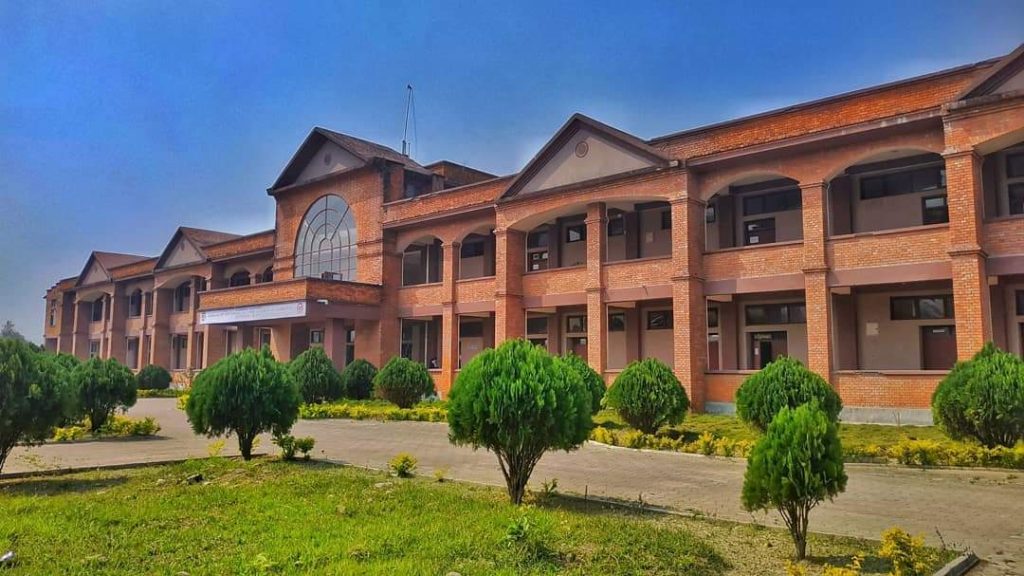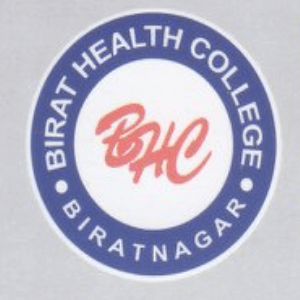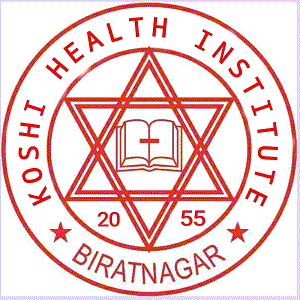Overview
Bachelor of Public Health (BPH) at Purbanchal University School of Health Sciences, Morang, Nepal
The Bachelor of Public Health (BPH) program at Purbanchal University School of Health Sciences (PUSHS), located in Biratnagar, Morang, Nepal, and affiliated with Purbanchal University (PU), is a four-year undergraduate degree that trains professionals to promote community and population health.
This public health degree in Nepal offers a broad curriculum covering the essential domains of public health. It prepares graduates to address diverse health challenges and improve public well-being. The BPH at PUSHS provides a robust educational foundation for individuals passionate about disease prevention, health promotion, and community service.

Curriculum Details
The four-year BPH curriculum at PUSHS is designed to provide a comprehensive understanding of public health principles and practices. It incorporates interdisciplinary courses, practical field experiences, and research components.
The curriculum is structured to cover core public health disciplines and emerging health issues.
Core Courses
The core courses of the BPH program provide a solid grounding in the fundamental areas of public health:
-
Epidemiology includes Studies of the distribution and determinants of health-related states or events in specific populations and the application of this study to control health problems.
-
Biostatistics: It applies statistical methods to biological and health sciences, essential for analyzing health data and interpreting research findings.
-
Environmental Health: It includes examining the impact of environmental factors on human health (HH) and strategies for managing and protecting environmental health.
-
Health Policy and Management: Covers health policy development, healthcare systems, health program management, and healthcare economics.
-
Social and Behavioral Sciences in Public Health: Explores social, cultural, and behavioral factors influencing health and strategies for health promotion and behavior change.
-
Health Promotion and Education: This program focuses on the principles and methods of health promotion, health education, and community mobilization for health improvement.
-
Maternal and Child Health: This area addresses the health needs of women, children, and families, including reproductive health, child development, and family health issues.
-
Nutrition in Public Health: This course examines the role of nutrition in public health, including nutritional assessment, dietary interventions, and food security issues.
-
Communicable and Non-Communicable Diseases: This section covers the epidemiology, prevention, and control of infectious and chronic diseases, major public health concerns globally and in Nepal.
-
Research Methods in Public Health: Introduces research methodologies specific to public health, enabling students to conduct and evaluate public health research.
-
Global Health: Explores global health issues, international health organizations, and health challenges in diverse global settings.
-
Public Health Ethics and Law: Covers ethical principles and legal frameworks relevant to public health practice and policy.
Specializations and Electives
The BPH program at PUSHS provides a broad public health education. While formal specializations might not be offered at the undergraduate level, students may have opportunities to focus their elective choices and project work in areas of particular interest, such as:
-
Disease Surveillance and Control: Focusing on epidemiological methods and disease control programs.
-
Health Promotion and Community Health: Concentrating on community-based interventions and health education strategies.
-
Environmental and Occupational Health: Exploring environmental health risks and workplace health promotion.
-
Health Policy and Management: Delving into healthcare administration and policy analysis.
This allows for focused study within the comprehensive public health curriculum.
Objectives
The BPH program at PUSHS aims to achieve the following key objectives:
-
To produce competent public health professionals capable of assessing, planning, implementing, and evaluating public health programs.
-
To develop skills in epidemiological analysis, biostatistical methods, and public health research.
-
To prepare graduates to address major public health challenges in Nepal and globally, including communicable and non-communicable diseases, environmental health risks, and health inequities.
-
To foster a commitment to health equity and social justice in public health practice.
-
To promote community engagement and participatory approaches in public health interventions.
-
To encourage leadership and management skills for effective public health program administration.
Scope
The scope of the BPH degree is broad, offering diverse career paths in the expanding field of public health, both in Nepal and internationally. BPH graduates can pursue public health careers in:
-
Government Health Agencies: Working at local, provincial, and national levels in public health departments, disease control centers, and health ministries.
-
Non-governmental Organizations (NGOs) and INGOs: Implementing and managing health projects focused on various public health issues.
-
Community Health Organizations: Working in community health centers, primary healthcare facilities, and local health initiatives.
-
Research Institutions: Participating in public health research, data analysis, and epidemiological studies.
-
International Health Organizations: Contributing to global health programs and initiatives with organizations like WHO, UNICEF, and others.
-
Healthcare Management and Administration: Roles in healthcare planning, policy analysis, and health program management.
-
Academia and Education: With further education, pursuing careers in teaching public health and related disciplines.
Learning Outcomes
Upon successful completion of the BPH program, graduates will be able to:
-
Apply public health principles and knowledge to address population health issues.
-
Conduct epidemiological investigations and analyze public health data using biostatistical methods.
-
Assess environmental health risks and propose interventions for environmental health protection.
-
Develop and manage public health programs effectively, including planning, implementation, and evaluation.
-
Apply social and behavioral science theories to design and implement health promotion programs.
-
Advocate for health policies and contribute to healthcare system improvement.
-
Communicate effectively with diverse audiences on public health issues.
-
Practice ethical public health and uphold professional standards.
Skill Development Modules
The BPH program at PUSHS integrates various skill development components:
-
Field Placements: Practical field experiences in public health settings, such as health posts, community health programs, and public health agencies.
-
Data Analysis Workshops: Hands-on training in statistical software and methods for analyzing public health data.
-
Program Planning and Management Exercises: Simulated real-world exercises in developing and managing public health interventions.
-
Community Health Projects: Participation in community-based health projects, applying public health principles in real settings.
-
Communication and Advocacy Training: Workshops and sessions to enhance communication, presentation, and advocacy skills for public health professionals.
Teaching Methodology
PUSHS employs diverse teaching approaches in the BPH program to foster active learning and practical application:
-
Interactive Lectures and Discussions: Engaging lectures encouraging student participation and critical thinking.
-
Problem-Based Learning: Learning through real-world public health problems and case studies.
-
Group Work and Projects: Collaborative projects to develop teamwork and applied public health skills.
-
Seminars and Presentations: Student-led seminars and presentations to enhance communication and knowledge dissemination.
-
Guest Lectures from Public Health Experts: Insights from practitioners and leaders in various public health fields.
-
Field Visits and Community Immersion: Direct exposure to public health realities in community settings.
Faculty Expertise
The BPH program faculty at PUSHS includes:
-
Public Health Specialists: Professionals with advanced degrees and extensive experience in various public health disciplines.
-
Epidemiologists and Biostatisticians: Experts in disease surveillance, data analysis, and public health research methods.
-
Environmental Health Scientists: Professionals with expertise in environmental health risks and management.
-
Health Policy and Management Experts: Faculty with healthcare administration, policy, and health systems backgrounds.
-
Social and Behavioral Scientists: Experts in health promotion, behavior change, and community health interventions.
Admission Requirements
Admission to the BPH program at PUSHS typically requires:
-
Successful completion of 10+2 or equivalent education, preferably with a science background.
-
Meeting minimum academic criteria as set by Purbanchal University and PUSHS.
-
It may involve an entrance examination conducted by PU or PUSHS.
-
Specific requirements should be verified from the official admissions announcements.
Career Opportunities
BPH graduates have a wide range of public health career opportunities:
-
Public Health Officer: In government health agencies, managing health programs and services.
-
Epidemiologist: Conducting disease surveillance and outbreak investigations.
-
Health Program Manager: Planning and managing health interventions in NGOs, government, or international organizations.
-
Health Promotion Specialist: Developing and implementing health education and promotion programs.
-
Environmental Health Officer: Assessing and managing environmental health risks.
-
Research Associate in Public Health: Participating in public health research projects.
-
Public Health Consultant: Providing expertise to organizations on public health issues.
Student Life and Extracurricular Activities
Student life in BPH at PUSHS includes:
-
Public Health Awareness Campaigns: Student-led initiatives to promote health in the community.
-
Health Camps and Community Service: Participation in health outreach activities.
-
Public Health Seminars and Workshops: Events focused on current public health topics.
-
Student Clubs and Organizations: Groups focused on public health and related interests.
-
Campus Environment: Supportive and engaging atmosphere for learning and collaboration.
Scholarships and Financial Aid
Information on BPH scholarships and financial aid at PUSHS can be obtained by contacting the institution directly. Students interested in pursuing public health are encouraged to inquire about:
-
Merit Scholarships for BPH Students: Recognizing academic excellence.
-
Need-Based Financial Assistance: Supporting students with financial needs.
-
Public Health Specific Grants: Potentially available from health-focused organizations or government programs.
Why Choose This Course?
Choosing the BPH program at PUSHS offers:
-
Comprehensive Public Health Education: Broad curriculum covering essential public health disciplines.
-
Practical Field Experience: Field placements and community projects for hands-on learning.
-
Diverse Career Pathways: Wide range of career opportunities in public health and related sectors.
-
Dedicated Faculty: Experienced public health professionals and educators.
-
Contribution to Public Well-being: Opportunity to make a meaningful impact on community and population health.
Why Choose This College?
PUSHS, as a leading public health college in Nepal and a health sciences institution in Biratnagar, provides:
-
Focused Public Health Programs: Dedicated to health sciences education.
-
Community-Oriented Approach: Emphasis on community health and public service.
-
Supportive Learning Environment: Engaging campus and dedicated faculty.
-
Affiliation with Purbanchal University: Reputable university recognition.
-
Strategic Location: Access to diverse public health settings in eastern Nepal.
Conclusion
The Bachelor of Public Health program at Purbanchal University School of Health Sciences is a comprehensive and impactful degree designed to develop skilled public health professionals. Located in Biratnagar, Nepal, and affiliated with Purbanchal University, PUSHS offers a robust curriculum, practical skill development, and a commitment to improving population health. For students dedicated to public health careers and seeking quality health sciences education in Nepal, the BPH program at PUSHS is an outstanding choice.
Contact Purbanchal University School of Health Sciences's administrative office for detailed information on the Bachelor of Public Health (BPH) course, including fees, scholarships, facilities, counseling, eligibility criteria, etc.

















